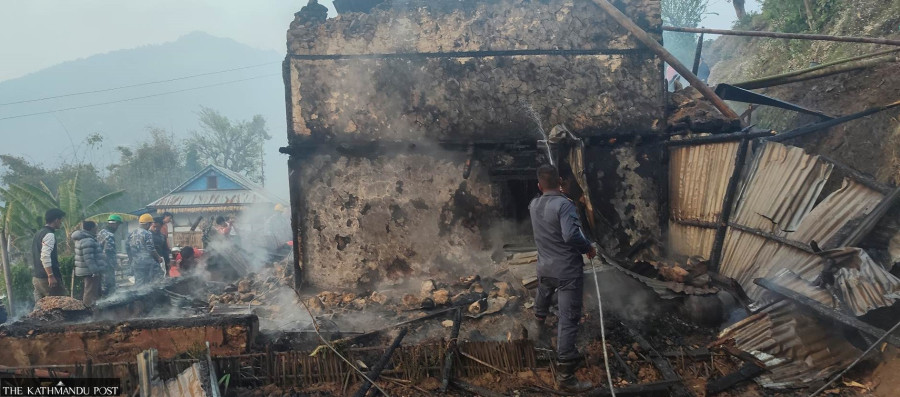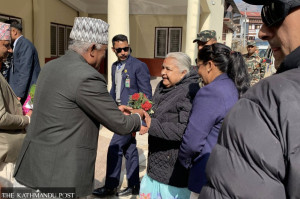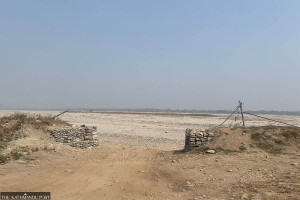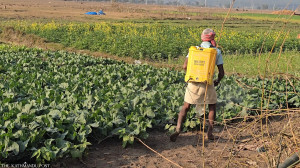Koshi Province
Eastern hill districts are ill-equipped to fight growing fire incidents
Of the eight local units in Panchthar district, only Phidim Municipality has fire trucks, which also serve neighbouring districts.
Laxmi Gautam
All family members of Prem Nemwang, residents of Nawamidanda in Panchthar’s Phalgunanda Rural Municipality, went to work in the fields on May 11 leaving his disabled son Man Kumar at home. Thirty-two-year-old Man Kumar, who cannot walk, would often be left at home when the family members are busy in the fields.
On that day, a fire broke out in the nearby Laksebung forest at around 2:30pm. A spark from the wildfire caught the thatched roof of Prem’s house. Soon the house was on fire and Man Kumar, who was trapped inside died before villagers could rescue him.
“The fire had already engulfed the house when we reached there. We saw Man Kumar struggling for life, but we could not save him. He died while we were trying our best to contain the fire,” said Hom Bahadur Angdembe, the ward chairman of Phalgunanda Ward 1.
The same day, Dil Kumari Bhujel, 50, and her 14-year-old son Bhupendra died in a forest fire in ward 3 of Chhathar Rural Municipality in the neighbouring Tehrathum district. The fire at Gadhi Community Forest had entered the settlement. “The blaze injured the mother and son while they were working in the fields near the forest,” said Inspector Hemraj Oli at Area Police Office in Basantapur. Four other villagers sustained injuries in the course of fighting the forest fire.

On May 10, a forest fire at ward 4 in Pathibhara Community Forest of Chhathar Jorpati Rural Municipality in Dhankuta spread to the settlement, destroying two houses belonging to Netra Bahadur Bishwakarma and Krishna Bishwakarma.
On February 13, two boys aged five and four died when a fire destroyed a house belonging to Prem Panthak at ward 7 of Hilihang Rural Municipality Ward 7 in Panchthar district. On the same day, a forest fire entered Chuhandanda of Aathrai Rural Municipality in Tehrathum, destroying 14 houses.
On January 4, Aasan Thebe, 23, and her sister-in-law Mamata Gurung, 22, died when their house caught fire in Phidim Municipality ward 8 of Panchthar. Two other family members sustained injuries in the inferno.
These are some representative cases of fire that destroyed lives and properties in various eastern hill districts of Koshi Province. Fire incidents, both house fires and wildfires, cause a huge loss of lives and properties in Panchthar, Ilam, Taplejung, Sankhuwasabha, Dhankuta, Khotang, Tehrathum, Okhaldhunga and Bhojpur districts every year.

A total of 842 incidents of fire were reported in Koshi Province over the past eight months, killing 15 people and injuring many others. According to records at the Provincial Police Office, fire destroyed a total of 445 houses and 182 sheds, displacing at least 141 families in the province. A total of 1,211 domesticated animals were also killed in the fire incidents. Properties worth approximately Rs757 million were ravaged by fires in the province, said police.
In Panchthar alone, five people died in a total of 80 incidents in the past eight months. According to the District Police Office, 15 of the incidents were caused by forest fires.
Fire incidents occur every dry season, but the local units are always caught unprepared. Of the total eight local units in Panchthar, only Phidim Municipality has two fire trucks. One is kept at the municipality’s office while the other is at the district police office. The same trucks are mobilised to fight fires even in the neighbouring Tehrathum and Taplejung districts. “We receive calls from Panchthar, Taplejung and Tehrathum. We always keep the trucks and the personnel on standby,” said Deputy Superintendent of Police Hari Khatiwada.

The wildfire season in Nepal generally starts in November-December and continues until the onset of monsoon, which hits the country in mid-June. Though forest fires are classified as natural disasters, only a fraction of them occur naturally. The majority of incidents result from human causes—poachers set fire to forests to disorient wild animals and farmers start fires to clear land for farming. Discarded cigarette butts are also among the biggest causes of fires.
Locals inform the police personnel, who are usually the first responders, only after the fire goes out of control. “Damage is already done by the time we reach the sites which are far from the district headquarters. The locals light fires in the forest to chase away wild animals and clear the bushes. It is quite difficult to control fires as villagers try to protect the guilty,” said Khatiwada.




 16.12°C Kathmandu
16.12°C Kathmandu













